Israel
Seitenübersicht
[Ausblenden]- 1 Introduction
- 2 Preparedness
- 3 Sense-making
- 3.1 First cases
- 3.2 Development of pandemic infections
- 3.2.1 Total cases
- 3.2.2 Daily cases
- 3.2.3 Total deaths
- 3.2.4 New cases vs. recoveries
- 3.3 Reporting
- 4 Decision-making and coordination
- 5 Legitimacy
- 6 Timeline of Covid-19 related events
- 7 Overall evaluation
- 8 Country´s favourite stay at home song
This wiki is about the Israeli state response to COVID-19.
The following pages provide an overview about the Israeli response to the COVID-19 pandemic, processing chronologically the instructions from the syllabus. The structure is based on the five critical tasks of strategic leadership by Boin et al..[1]
Due to the time frame of the the lecture, it only covers all Covid-19 relatied events till June 30th when the draft for the wiki was supposed be finished. All happening after even though potentially important, will not be part of this wiki.
The following pages provide an overview about the Israeli response to the COVID-19 pandemic, processing chronologically the instructions from the syllabus. The structure is based on the five critical tasks of strategic leadership by Boin et al..[1]
Due to the time frame of the the lecture, it only covers all Covid-19 relatied events till June 30th when the draft for the wiki was supposed be finished. All happening after even though potentially important, will not be part of this wiki.
1 Introduction
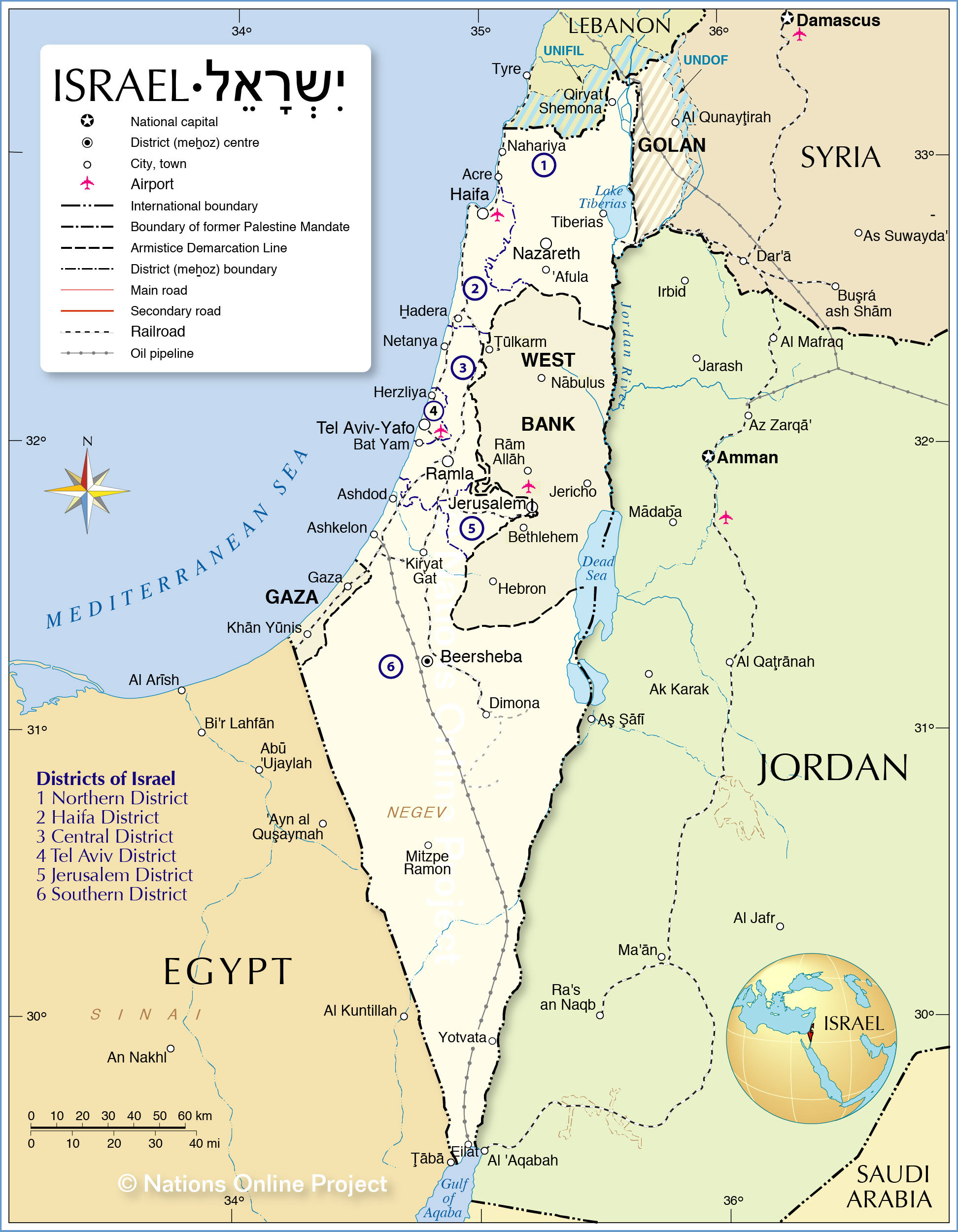
To simplify the access for those who may not be informed about the country´s properties and characteristics, I gave a short introduction with general information.
Israel is a democratic country in the Middle East. Lying between the Mediterranean and the river Jordan, it covers an area that approximates the size of Hessia.[2] [3]
The Jewish state is home of 9,2 million people.[4] The population is ethnically diverse and with 30,2 years one of the youngest among OECD states.[5] [6] [7]
Around 92 percent of its citizens live in urban areas, most of them in the metropolitan of Tel-Aviv and Jerusalem.[8]
The Gross Domestic Product per capita even though rapidly growing in the last decades is still under the level of the European average and converges to the GDP of Spain.[9] [10]
After over a year without proper government and many failed attempts to get a parliamentary majority, long-time Prime Minister Benjamin Netanyahu and his challenger Benny Gantz agreed on forming an emergency government to face the corona crises jointly.[11]
Israel is a democratic country in the Middle East. Lying between the Mediterranean and the river Jordan, it covers an area that approximates the size of Hessia.[2] [3]
The Jewish state is home of 9,2 million people.[4] The population is ethnically diverse and with 30,2 years one of the youngest among OECD states.[5] [6] [7]
Around 92 percent of its citizens live in urban areas, most of them in the metropolitan of Tel-Aviv and Jerusalem.[8]
The Gross Domestic Product per capita even though rapidly growing in the last decades is still under the level of the European average and converges to the GDP of Spain.[9] [10]
After over a year without proper government and many failed attempts to get a parliamentary majority, long-time Prime Minister Benjamin Netanyahu and his challenger Benny Gantz agreed on forming an emergency government to face the corona crises jointly.[11]
Map: [12]
2 Preparedness
Being a country facing a permanent security threat by its neighbours, a national plan for pandemic preparedness and risk management is not publicly available. Therefore, the research for information of specific pandemic preparation was challenging[13] .
To address this issue, I focused on secondary literature quoting or paraphrasing from such documents and shifted my emphasis rather to treatment capabilities as well as to the capacity of the healthcare system as a whole. Still the literature did not cover sufficient information on concrete measures taken in case of a pandemic, e.g. social distancing-measures or emergency strategies for hospitals.
To address this issue, I focused on secondary literature quoting or paraphrasing from such documents and shifted my emphasis rather to treatment capabilities as well as to the capacity of the healthcare system as a whole. Still the literature did not cover sufficient information on concrete measures taken in case of a pandemic, e.g. social distancing-measures or emergency strategies for hospitals.
2.1 The Israeli healthcare system
Universal healthcare in Israel was established only 25 years ago.[14] The mandatory insurance program is financed through a national income tax and enables citizens to receive medical treatments without fearing financial consequences afterwards.[15]
Although being ranked at the 6th position on Bloomberg´s health care index, critics claim that there are not enough capacities to treat patients appropriately due to massive underfunding of the public health sector.[16] [17]
Still the Israeli health system is extremely efficient. Spending only 7,5 percent of GDP on healthcare (in comparison US: 17,9%, Germany 11,7%, OECD average 8,9%), Israeli hospitals manage to keep their patients for an average of only 6.8 days till curation, which is very short compared to other countries.[18] [19]
However, the country suffers a shortage of hospital beds, only three 3.1 on 1000 people.[20]
The life expectancy is far over the OECD average and also the infant mortality rate even lower than in Germany.[21]
Although being ranked at the 6th position on Bloomberg´s health care index, critics claim that there are not enough capacities to treat patients appropriately due to massive underfunding of the public health sector.[16] [17]
Still the Israeli health system is extremely efficient. Spending only 7,5 percent of GDP on healthcare (in comparison US: 17,9%, Germany 11,7%, OECD average 8,9%), Israeli hospitals manage to keep their patients for an average of only 6.8 days till curation, which is very short compared to other countries.[18] [19]
However, the country suffers a shortage of hospital beds, only three 3.1 on 1000 people.[20]
The life expectancy is far over the OECD average and also the infant mortality rate even lower than in Germany.[21]
2.2 Pandemic preparedness
Israel´s pandemic preparedness plan follows five key goals to keep the consequences of a pandemic as small as possible:
The military has always played a major part in Israel´s daily. Likewise, the defense sector plays an important role in dealing role in health crises in terms of governance capacity.[22] Having the infrastructure, the know-how as well as the coordination capacity, the Israeli Defense Forces (IDF) and the Ministry of Defense (MoD) contribute a valuable asset when fighting a pandemic.
Therefore, it is provided for by statute that the MoD at a certain level of escalation during a pandemic, can supersede the Ministry of Health as coordinator of the crisis. Depending on factors such as geographical spread and nature of the virus, the government can decide to shift power to the MoD, if phase 5 or 6 of World Health Organization Pandemic Alert is proclaimed and one of the following four cases occurs:
Phase 5 of WHO Pandemic Alert would be a scenario in which a virus is spread “by human-to-human […] into at least two countries in one WHO region”.[23] In Israel´s case that could mean an outbreak in Pakistan and Western Sahara would give the government legal authority to impose measures described above. If the MoD was in charge of handling a pandemic it would have sweeping powers by coordinating essential services like electricity supply, water and medical services.[24]
- Reduce morbidity and mortality
- Contain and stabilize the epidemic to reduce viral spread
- Maintain normal, routine functions of the civilian population
- Maintain healthcare by minimizing strains on the system and preventing system failure
- Limit the financial burden on the Israeli economy
The military has always played a major part in Israel´s daily. Likewise, the defense sector plays an important role in dealing role in health crises in terms of governance capacity.[22] Having the infrastructure, the know-how as well as the coordination capacity, the Israeli Defense Forces (IDF) and the Ministry of Defense (MoD) contribute a valuable asset when fighting a pandemic.
Therefore, it is provided for by statute that the MoD at a certain level of escalation during a pandemic, can supersede the Ministry of Health as coordinator of the crisis. Depending on factors such as geographical spread and nature of the virus, the government can decide to shift power to the MoD, if phase 5 or 6 of World Health Organization Pandemic Alert is proclaimed and one of the following four cases occurs:
- A threat to national security
- An inability of the civilian system to manage the crisis
- A need for a rapid nationwide, interdisciplinary coordinated response
- A collapse of the civilian system
Phase 5 of WHO Pandemic Alert would be a scenario in which a virus is spread “by human-to-human […] into at least two countries in one WHO region”.[23] In Israel´s case that could mean an outbreak in Pakistan and Western Sahara would give the government legal authority to impose measures described above. If the MoD was in charge of handling a pandemic it would have sweeping powers by coordinating essential services like electricity supply, water and medical services.[24]
2.3 The State Comptroller´s report 2020
End of March 2020, Israel’s State Comptroller Matanyahu Engelman published a report which assesses the overall ability of the healthcare system to resist an epidemic. Apparently, that was in the middle of the Coronavirus crisis, but it was created and already finished in previous November and therefore gives information of the state preparedness before COVID-19.
However, the State Controller decided to hold back the report due to the political chaos during that time. Even though critics saying that the report lacks concrete naming and blaming of responsible government officials, it is clear in addressing the weaknesses of the healthcare system.
The report assumes a scenario in which an influenza is challenging the country´s health system. It supposes that an outbreak would affect 2,25 million citizens within weeks, a quarter of the country’s population. In such a case a 150,000 would need hospitalization, 25,000 in intensive care units, 12,000 would be in need of ventilation.[25]
From the data of the WHO we know that only 0,3 percent of the population could be provided even with hospital beds.[26]
The supply with drugs would be insufficient, too. Only 16 percent of required 25 percent are currently in stock.[27]
All in all, the report delivers a damning indictment of the Israeli healthcare system and sees the country in a deficient condition to fight an epidemic appropriately.
Still it is important to add that the described scenario expects an epidemic in Israel, not a pandemic coming from abroad. Being already in the country, it would be much harder for authorities to take action than anticipating a virus that has already hit another state. Therefore, the state of preparedness cannot be looked at in a one-to-one comparison. Yet it unfolds the weaknesses of the Israeli health-hardware in a vivid way.
However, the State Controller decided to hold back the report due to the political chaos during that time. Even though critics saying that the report lacks concrete naming and blaming of responsible government officials, it is clear in addressing the weaknesses of the healthcare system.
The report assumes a scenario in which an influenza is challenging the country´s health system. It supposes that an outbreak would affect 2,25 million citizens within weeks, a quarter of the country’s population. In such a case a 150,000 would need hospitalization, 25,000 in intensive care units, 12,000 would be in need of ventilation.[25]
From the data of the WHO we know that only 0,3 percent of the population could be provided even with hospital beds.[26]
The supply with drugs would be insufficient, too. Only 16 percent of required 25 percent are currently in stock.[27]
All in all, the report delivers a damning indictment of the Israeli healthcare system and sees the country in a deficient condition to fight an epidemic appropriately.
Still it is important to add that the described scenario expects an epidemic in Israel, not a pandemic coming from abroad. Being already in the country, it would be much harder for authorities to take action than anticipating a virus that has already hit another state. Therefore, the state of preparedness cannot be looked at in a one-to-one comparison. Yet it unfolds the weaknesses of the Israeli health-hardware in a vivid way.
3 Sense-making
Following Boin et al., sense making describes the process of collecting information that will help to handle a crisis. Leaders must filter among significant and non-significant information to provide appropriate solution. [28] . Sense making is a fundamental part of managing crises because it builds the fundament of all later action.
Unfortunately, I was unable to find a note on the country´s testing and reporting logic. I am sure that there are documents existing that provide information about the searched-for aspects. Some of them might be in Hebrew but even after tedious research and native speaker looking for documents, I could not manage to find documents worth analyzing here.
Therefore, the following data regrettably only shows the development of the pandemic in terms of infections and cured/deaths over the time without further scrutinizing of their method.
Therefore, the following data regrettably only shows the development of the pandemic in terms of infections and cured/deaths over the time without further scrutinizing of their method.
3.1 First cases
On February 21, the first person in Israel was tested Covid-19 positive. Together with eleven other passengers from the Diamond Princess she has been flown in to Israel from Japan and was held in quarantine for 14 days afterwards. Three days later another person from the same cruiser was tested positive during quarantine.[29]
The first case which contacts could not be fully retraced and who has not been put into quarantine immediately was a man arriving from Italy. He spent several days without realizing that he was positive and is likely to be the source for many others to be infected, including his wife.[30]
The first case which contacts could not be fully retraced and who has not been put into quarantine immediately was a man arriving from Italy. He spent several days without realizing that he was positive and is likely to be the source for many others to be infected, including his wife.[30]
3.2 Development of pandemic infections
3.2.1 Total cases
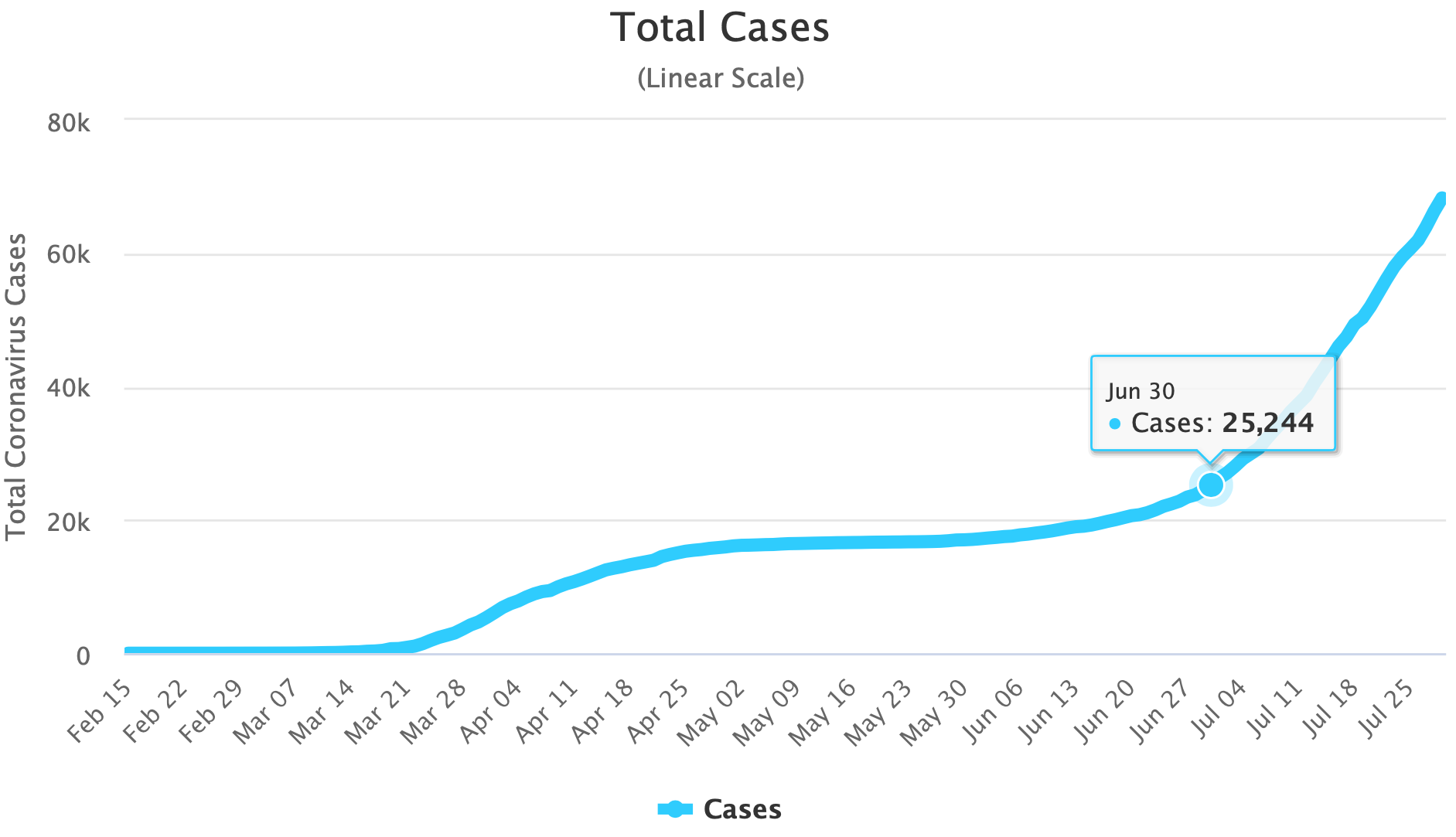
3.2.2 Daily cases
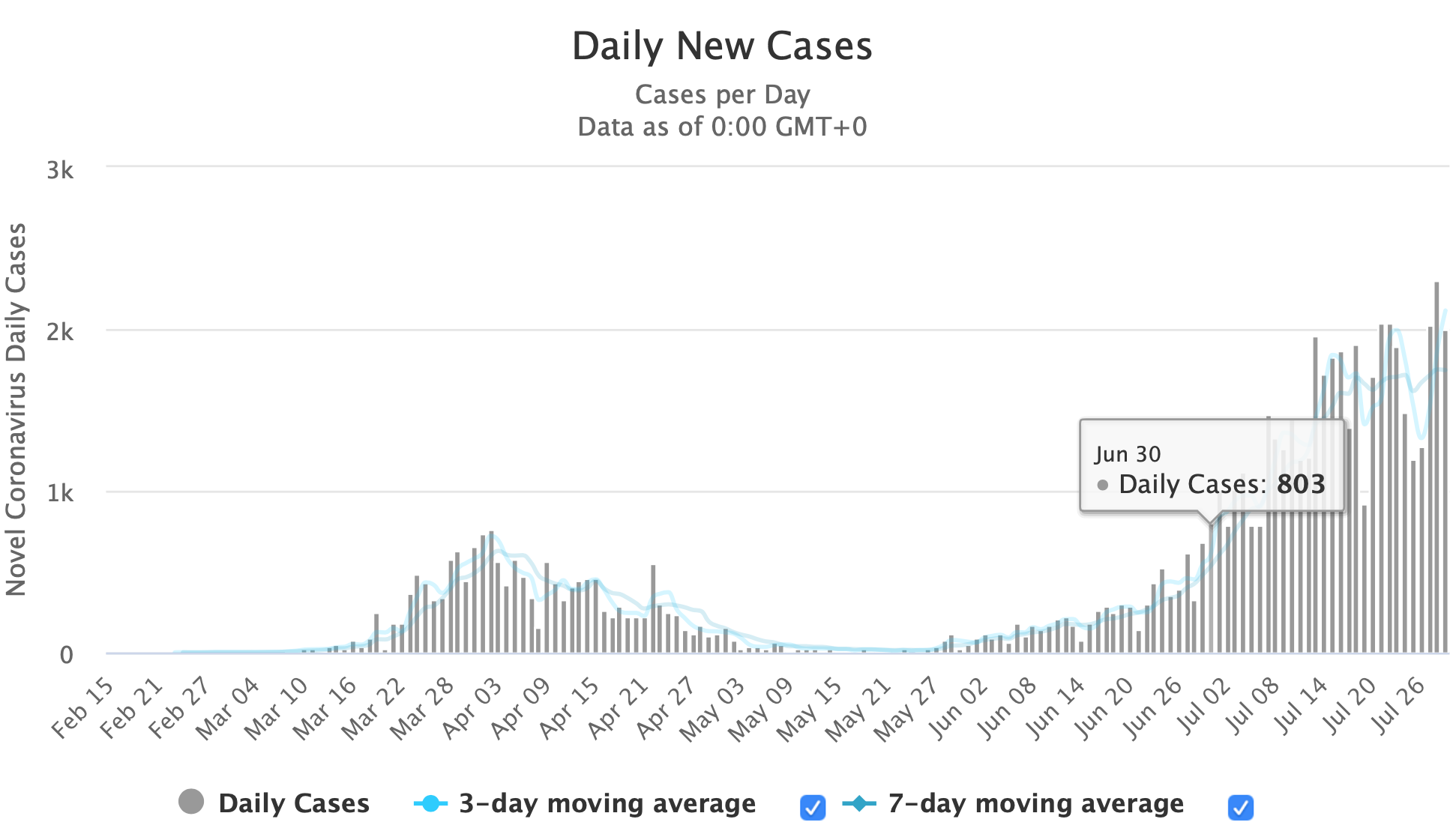
3.2.3 Total deaths
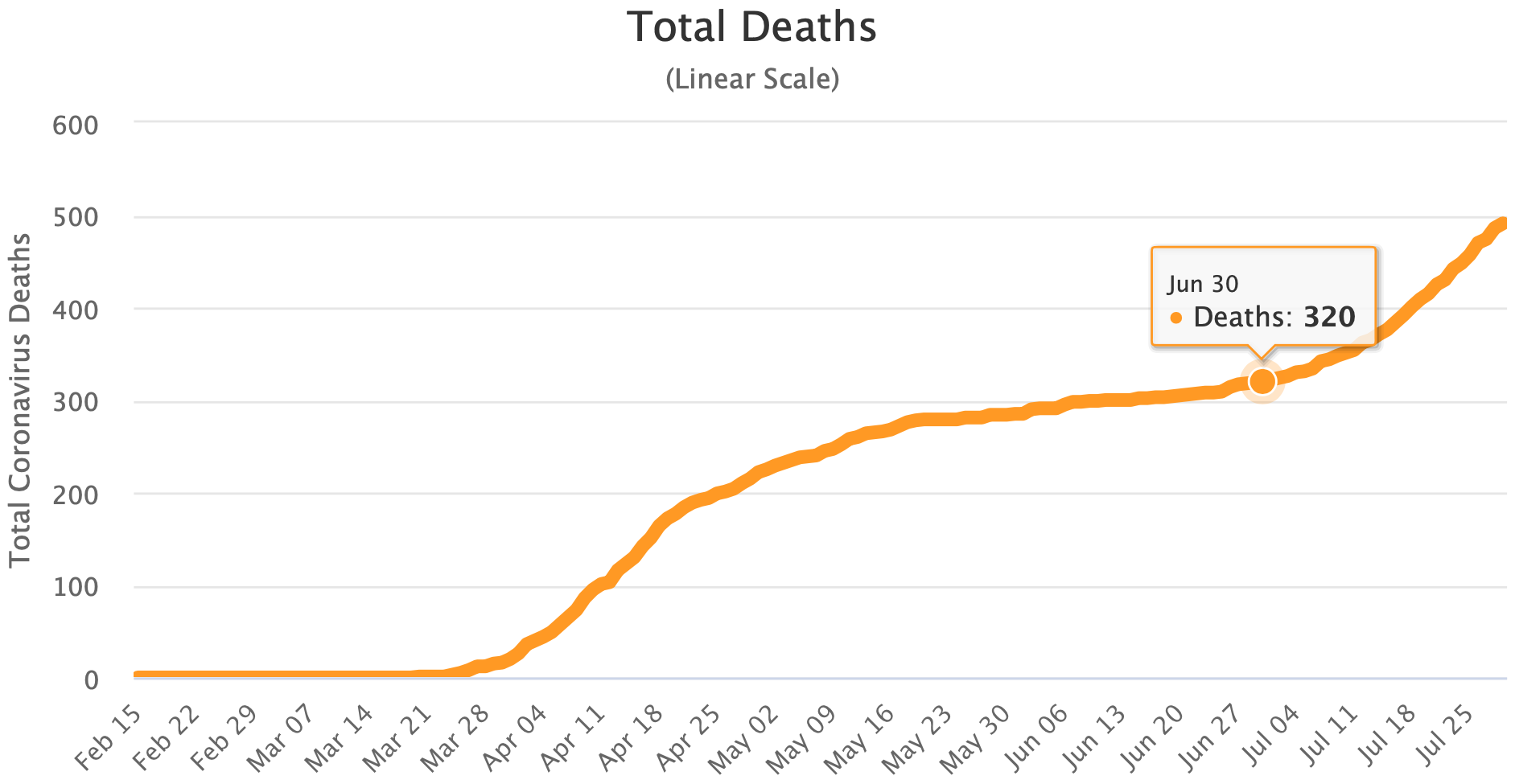
3.2.4 New cases vs. recoveries

All graphs: [31]
To watch the development of Israel´s COVID-19 infections in real time, click here.
To compare Israel´s pandemic development with the performance of other countries, check out Johns Hopkins Covid-19 dashboard.
To compare Israel´s pandemic development with the performance of other countries, check out Johns Hopkins Covid-19 dashboard.
3.3 Reporting
How it was said in the beginning of this chapter, I cannot provide this wiki with information about testing and reporting. Still assumptions can be made concerning Israel´s reporting logic. Comparing the death rate among infected to other countries with similar numbers of infections, one can observe that Israel has a very small number of Covid-19 deceased.[32]
This might be due to the reason that only people who died verifiable because of Corona were count. Countries that adopted the described way of reporting, like Russia have a very similar death rate to Israel. However, countries that counted all people dying with Covid-19 as Corona-dead, like Belgium, have a high death rate among infected.[33]
This might be due to the reason that only people who died verifiable because of Corona were count. Countries that adopted the described way of reporting, like Russia have a very similar death rate to Israel. However, countries that counted all people dying with Covid-19 as Corona-dead, like Belgium, have a high death rate among infected.[33]
4 Decision-making and coordination
Crisis with a high number of unknown unknowns, require fast and resolute decision making. This includes offering an analysis of the situation as well as a convincing narrative which helps citizens to classify what is going on.
Being a unitary state, measures taken affect the country as a whole. Single deviations like the closure of Bnei Brak is taken into account by a distinct paragraph.
4.1 Travel restriction and 14-day quarantine
Israel was one of the first countries to adopt travel restrictions. Already in the end of January, the Ministry of Health warned Israel´s citizens to avoid all non-essential traveling to China. Four days later an official travel ban was imposed that prohibits non-Israelis coming from China to enter Israel. Additionally, all citizens were put in a 14 days quarantine.[34]
On February 17, the list of countries which travelers were not allowed to enter was extended by a group of other East Asian countries, among them Thailand, Hong Kong and Singapore.[35]
The following Saturday, a flight from South Korea landed at Tel-Aviv´s Ben Gurion Airport. Before, the number of Covid-19 infected people had doubled in South Korea within a few days. Therefore, the Israeli authorities denied all non-Israelis the entry and put the others in quarantine. The plane was sent back the 12 hours flight to South Korea the very same day.[36] Later travel restrictions for South Korea and Japan similar to the ones already existing for other East Asian countries were imposed.[37]
On March 9, Prime Minister Benjamin Netanyahu announced on Twitter that all people entering Israel will have to spend 14 days in self-isolation. Further non-Israelis have to prove that they have an appropriate place to spend quarantine.[38] [39]
From March 12 onwards, the Israeli borders were finally closed, and no foreigners were allowed to travel to the country.[40]
Even though denying non-Israelis to enter Israel, the country brought back hundreds of its citizens home who were likely to get stuck on airports in other countries.[41]
On February 17, the list of countries which travelers were not allowed to enter was extended by a group of other East Asian countries, among them Thailand, Hong Kong and Singapore.[35]
The following Saturday, a flight from South Korea landed at Tel-Aviv´s Ben Gurion Airport. Before, the number of Covid-19 infected people had doubled in South Korea within a few days. Therefore, the Israeli authorities denied all non-Israelis the entry and put the others in quarantine. The plane was sent back the 12 hours flight to South Korea the very same day.[36] Later travel restrictions for South Korea and Japan similar to the ones already existing for other East Asian countries were imposed.[37]
On March 9, Prime Minister Benjamin Netanyahu announced on Twitter that all people entering Israel will have to spend 14 days in self-isolation. Further non-Israelis have to prove that they have an appropriate place to spend quarantine.[38] [39]
From March 12 onwards, the Israeli borders were finally closed, and no foreigners were allowed to travel to the country.[40]
Even though denying non-Israelis to enter Israel, the country brought back hundreds of its citizens home who were likely to get stuck on airports in other countries.[41]
4.2 “A new way of life”
On March 14, Prime Minister Benjamin Netanyahu declared a number of measures.
Comparing the virus to an invisible enemy, he sets up his narrative and frames the virus for the coming months. He uses terms that are normally known from a war or military context. The clip gives a short impression of how the Prime Minister is constructing his narrative and how he tries to unite the country behind him. At the same time, he present himself as the leading figure in the health crisis. Interesting here is the similarity to France where President Macron used almost the same words.
Before the speech, schools had already been closed until Passover holiday, only preschools, special education center and youth-at-risk center would stay open.[42]
The new measures included a 2-meter distance at all times, restrictions on gatherings of more than 10 people at the same place and many other recommendations.
These restrictions were further extended on March 31 by the national state of emergency. From this day on, former recommendations were legally imposed. Additionally, people were not allowed to leave their house for more than 100-meter and all non-essential business throughout the country were shut down.[43]
Yet exceptions were made due to religious reasons. For instance, praying at the Western Wall, the brit milah (male circumcision) in small groups and mikvoth (ritual bath) were still possible with little limitations.[44]
Violations of one of these measures were charged by financial penalties and in some cases even prison.
A detailed list of all restrictions can be seen here!
Video: PM Netanyu declaring new measures on March 14.[45]
Comparing the virus to an invisible enemy, he sets up his narrative and frames the virus for the coming months. He uses terms that are normally known from a war or military context. The clip gives a short impression of how the Prime Minister is constructing his narrative and how he tries to unite the country behind him. At the same time, he present himself as the leading figure in the health crisis. Interesting here is the similarity to France where President Macron used almost the same words.
Before the speech, schools had already been closed until Passover holiday, only preschools, special education center and youth-at-risk center would stay open.[42]
The new measures included a 2-meter distance at all times, restrictions on gatherings of more than 10 people at the same place and many other recommendations.
These restrictions were further extended on March 31 by the national state of emergency. From this day on, former recommendations were legally imposed. Additionally, people were not allowed to leave their house for more than 100-meter and all non-essential business throughout the country were shut down.[43]
Yet exceptions were made due to religious reasons. For instance, praying at the Western Wall, the brit milah (male circumcision) in small groups and mikvoth (ritual bath) were still possible with little limitations.[44]
Violations of one of these measures were charged by financial penalties and in some cases even prison.
A detailed list of all restrictions can be seen here!
Video: PM Netanyu declaring new measures on March 14.[45]
4.3 The closure of Bnei Brak
On April 2, the government declared the city of Bnei Brak with its 200.000 inhabitants to a restricted zone. That made it impossible to move in and out of the ultra-orthodox city which has become the largest epicenter for the pandemic right after Jerusalem. Measured by infections per capita, it scores even higher than the capital. To prevent the most vulnerable elderlies, the IDF removed over 4000 over 80-year-old out of Bnei Brak.[46]
The case of Bnei Brak is only one of many examples for haredi being disproportionally infected with Covid-19. That time, half of all infected were ultra-orthodox, although being only 12% of population.
The case of Bnei Brak is only one of many examples for haredi being disproportionally infected with Covid-19. That time, half of all infected were ultra-orthodox, although being only 12% of population.
4.4 Tracking of infected individuals
17 of March, the Knesset approved a law that allows the Israeli domestic intelligence agency Shin Bet to use phone data in order to track infected people. This way of collecting data was usually taken to fight terrorism.
The retracing should help to identify persons who had been in contact with infected individuals. Anybody who spent time with somebody Covid-19 positive would be informed by the Ministry of Health. After having been informed that somebody had contact with a Covid-19 positive, people where sent a message on their phone telling them to keep self isolation. This rule will be enforced by the police by controlling if citizens are really staying at home.[47]
Additionally, a voluntary app by the Ministry of Health collects data and informs people if they had been in contact with an infected person. If you are infected yourself, you can inform the ministry by the app. The location data of infected people is publicly available.[48]
A map by the Israeli Health Ministry with the locations where people are staying at home, can be seen here.
To see how the tracking of infected Israelis works in practice, have a look at the Contact Tracking Website of the MoD (Click on "עִברִית" in the upper right corner, and then choose English)!
This map shows places and times where corona patients have been staying for the last 14 days before entering isolation. The source of the information is epidemiological investigations by the Ministry of Health.
The retracing should help to identify persons who had been in contact with infected individuals. Anybody who spent time with somebody Covid-19 positive would be informed by the Ministry of Health. After having been informed that somebody had contact with a Covid-19 positive, people where sent a message on their phone telling them to keep self isolation. This rule will be enforced by the police by controlling if citizens are really staying at home.[47]
Additionally, a voluntary app by the Ministry of Health collects data and informs people if they had been in contact with an infected person. If you are infected yourself, you can inform the ministry by the app. The location data of infected people is publicly available.[48]
A map by the Israeli Health Ministry with the locations where people are staying at home, can be seen here.
To see how the tracking of infected Israelis works in practice, have a look at the Contact Tracking Website of the MoD (Click on "עִברִית" in the upper right corner, and then choose English)!
This map shows places and times where corona patients have been staying for the last 14 days before entering isolation. The source of the information is epidemiological investigations by the Ministry of Health.
5 Legitimacy
Unfortunately, I was unable to find time series or panel data which covers people´s attitude towards the government or politicians for a certain time. Therefore, the following surveys are in some cases lacking comparability. Still major trends are observable and sufficient to draw inference from.
After over a year without proper government and many failed attempts to get a parliamentary majority, long-time Prime Minister Benjamin Netanyahu and his challenger Benny Gantz agreed on forming an emergency government to face the corona crises jointly.
Still the Coronavirus was not the dominant issue during the race, even though some people voted in quarantine. Instead corruption accusations against Netanyahu and ambitious plans of the Israeli-right to annex parts of the Westbank were salient topics.[49]
The turnout increased to 72 percent, more than in the elections before.[50]
Although having to face a trial on court just a few weeks after the election, Netanyahu won clearly.[51]
After over a year without proper government and many failed attempts to get a parliamentary majority, long-time Prime Minister Benjamin Netanyahu and his challenger Benny Gantz agreed on forming an emergency government to face the corona crises jointly.
Still the Coronavirus was not the dominant issue during the race, even though some people voted in quarantine. Instead corruption accusations against Netanyahu and ambitious plans of the Israeli-right to annex parts of the Westbank were salient topics.[49]
The turnout increased to 72 percent, more than in the elections before.[50]
Although having to face a trial on court just a few weeks after the election, Netanyahu won clearly.[51]
5.1 Government performance
Comparing different polls about the popularity of the government over time, we see that especially the Prime Minister and his party got approval for their way of handling the crisis. In an early state of the pandemic 68 percent were satisfied with Netanyahu´s way of dealing with Covid-19. His deputy Benny Gantz however loses popularity and so does his party.
In the middle of July Netanyahu still performs well from a health perspective. Yet his handling of the economy during the crisis is seen more skeptical.[52]
The most current Poll from the middle of June by The Jerusalem Post, sees Gantz´s smaller coalition party dropping by almost a third. Likud, the party of the Prime Minister can gain over 10 percent.[53]
In the middle of July Netanyahu still performs well from a health perspective. Yet his handling of the economy during the crisis is seen more skeptical.[52]
The most current Poll from the middle of June by The Jerusalem Post, sees Gantz´s smaller coalition party dropping by almost a third. Likud, the party of the Prime Minister can gain over 10 percent.[53]
5.2 Trust in government and personalities
The first survey is the Israeli Voice Index for March which is collected monthly by the Israel Democratic Institute. Regrettably it asks different questions every time which makes it hard to track public opinion on some topics.
Still it provides information about the leading characters in fighting the Covid-19 crisis.
Health Ministry director general Moshe Bar Siman Tov and Prime Minister Netanyahu are by far the most popular figures.
Health Minister Jaakov Litzman could not benefit from his favorable position. His performance during the crisis is seen as weak and litte reliable. The ultra-orthodox Minister infected parts of the government himself and went to synagogue even though he was supposed to stay in quarantine.[54]
Still it provides information about the leading characters in fighting the Covid-19 crisis.
Health Ministry director general Moshe Bar Siman Tov and Prime Minister Netanyahu are by far the most popular figures.
Health Minister Jaakov Litzman could not benefit from his favorable position. His performance during the crisis is seen as weak and litte reliable. The ultra-orthodox Minister infected parts of the government himself and went to synagogue even though he was supposed to stay in quarantine.[54]

Figure 2.
5.3 Severity of the governmental restrictions
The restrictions are mostly seen as appropriate or even too weak. Surprisingly among Arabs the restrictions are seen as not severe enough. However, Jews are mostly content with the measures.

Figure 3.
5.4 Trust in the Shin Bet
Different attitudes between Arabs Israelis and Jewish Israelis are also measured when it come to the trust in the Shin Bet which tracks people´s cellphone to see whether they were in contact with infected persons.

Figure 4.[55]
5.5 Trust in government information policy
The high trust in the director general of the Health Ministry also appears in the public opinion towards the information policy of his house. The same is also the case with the Prime Minister´s announcements. Scientists have the highest credibility in the Israeli public whereas the media seems to lack trust during the corona crisis.

Figure 5.[56]
5.6 State of democracy and internal social relationships
Interestingly the trust in governance as well as the confidence towards the future of security have increased during the crisis. However, a majority thinks the relations between the public and the government have been damaged during the coronavirus crisis.
Inner societal cleavages have particularly increased between Haredim and the rest.
Inner societal cleavages have particularly increased between Haredim and the rest.
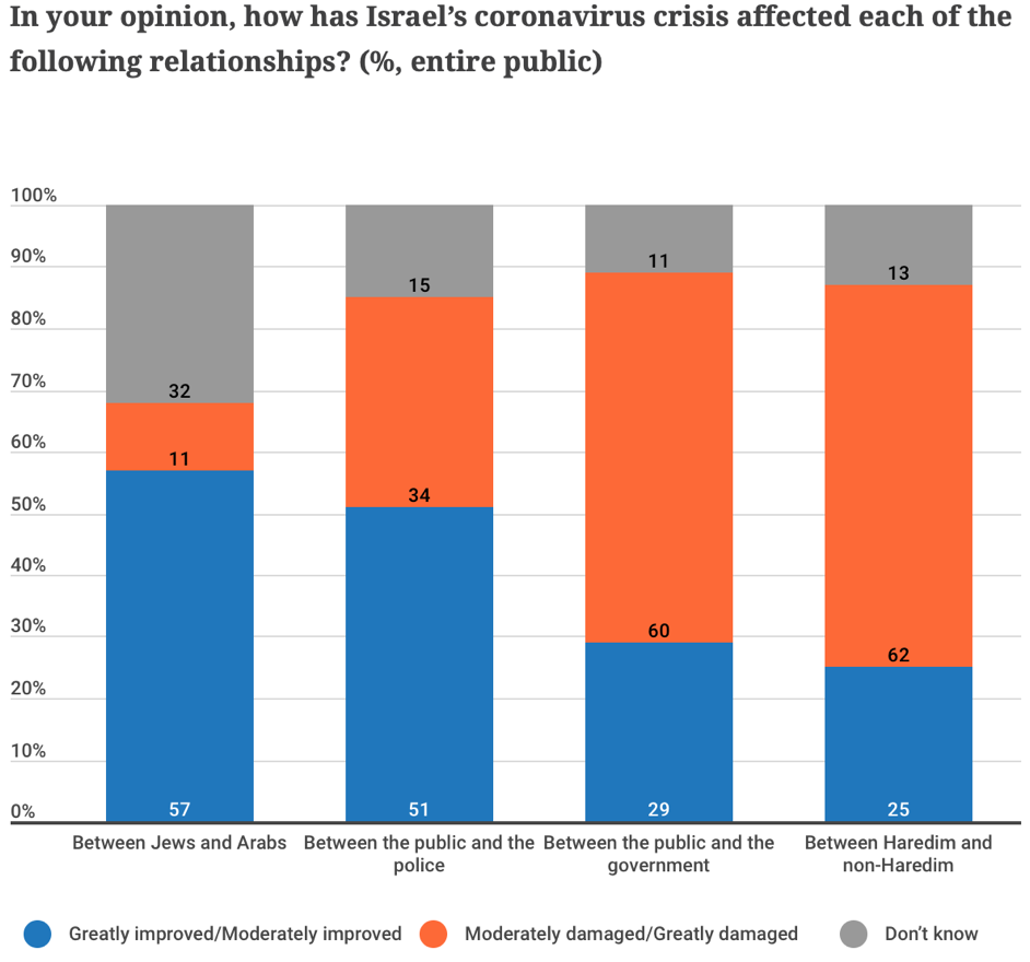
Figure 6.
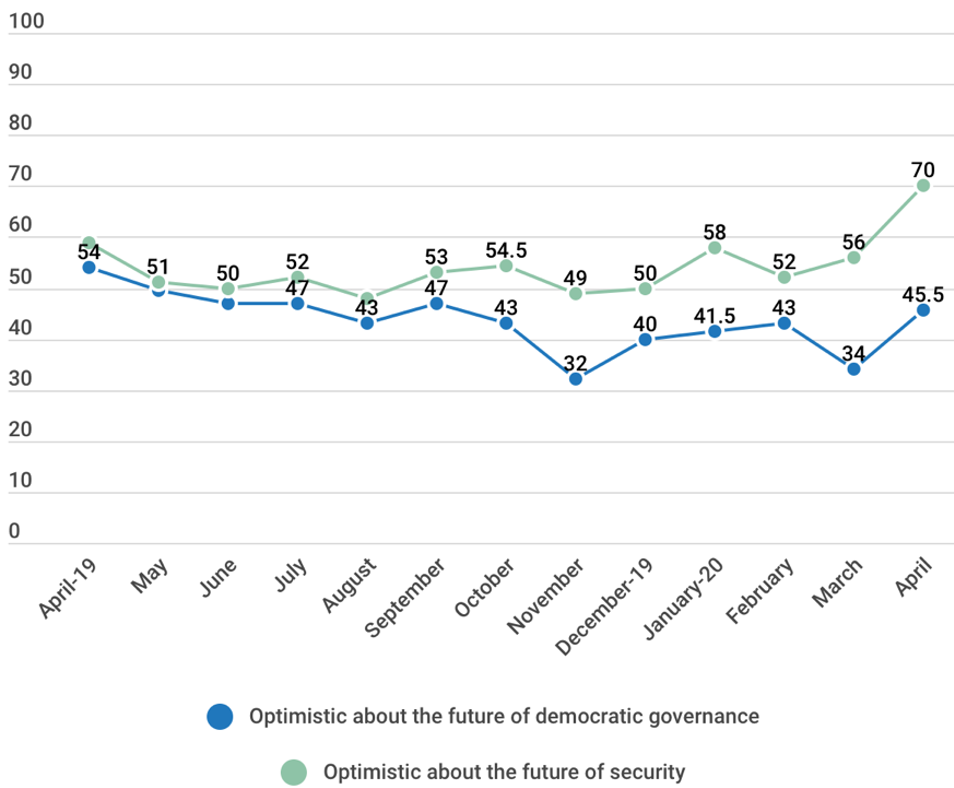
Figure 7.[57]
6 Timeline of Covid-19 related events
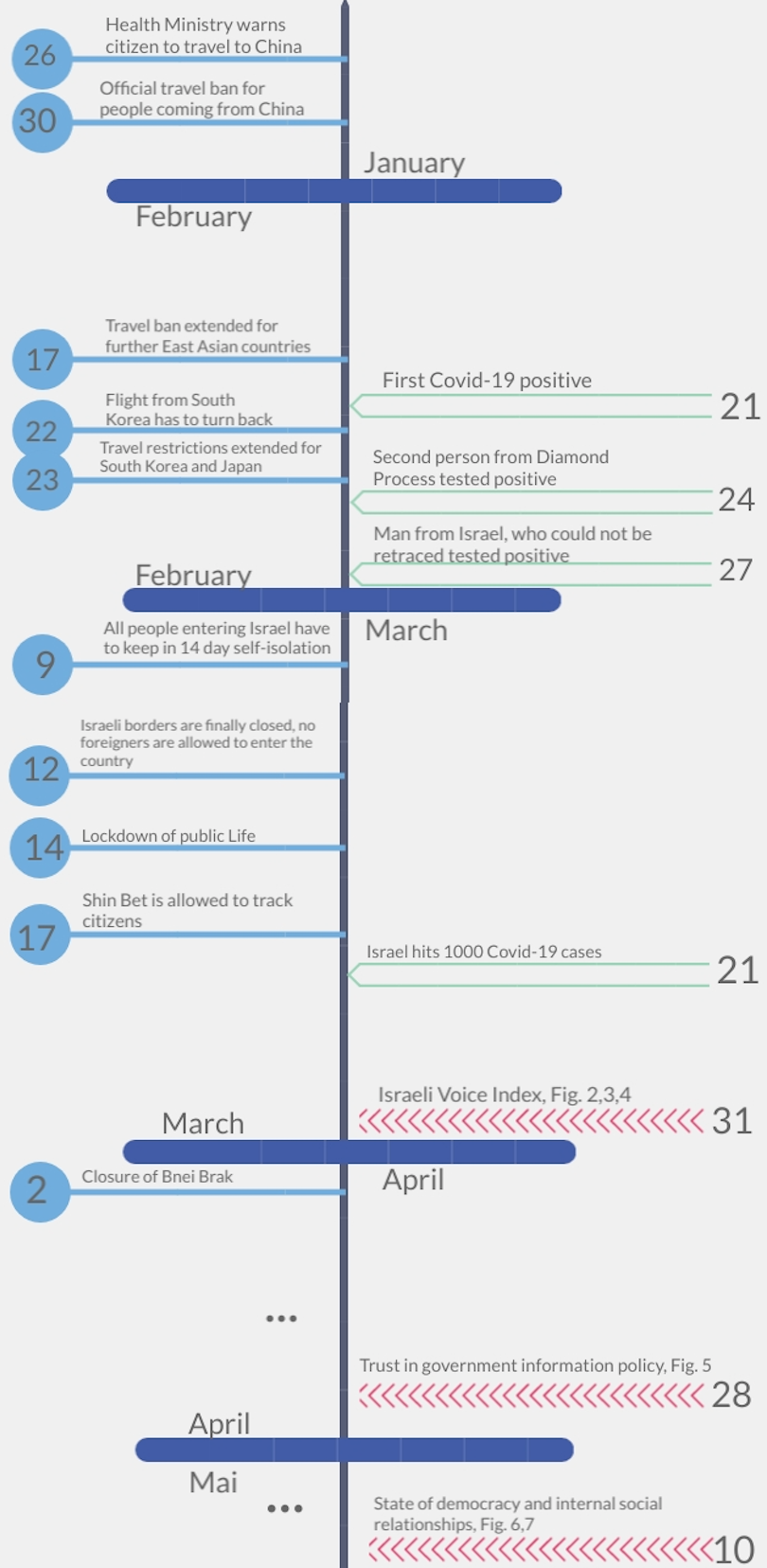
7 Overall evaluation
According to Boin et al. threat, urgency and uncertainty are key characteristics of any crisis. These characterisics also show up in the Covid-19 pandemic in Israel.[58]
This wiki has so far followed the “Five Tasks of Strategic Crisis Leadership” which Boin et al. examined in their work on Crisis Management. In this last paragraph, the measures taken by the Israeli government in terms of decision making and coordinating will be evaluated followed by a note on democratic legitimacy. Due to the topicality of Covid-19, however, the last of Boin´s tasks, which is learning from a crisis, cannot be covered.
This wiki has so far followed the “Five Tasks of Strategic Crisis Leadership” which Boin et al. examined in their work on Crisis Management. In this last paragraph, the measures taken by the Israeli government in terms of decision making and coordinating will be evaluated followed by a note on democratic legitimacy. Due to the topicality of Covid-19, however, the last of Boin´s tasks, which is learning from a crisis, cannot be covered.
7.1 Evaluation of decision-making and coordinating
Although having diagnosed the first confirmed Covid-19 case relatively late in comparison to other countries, the Israeli administration was early aware of the magnitude which Covid-19 could develop. Looking at other countries for example France, which did not even adopted measures when already cases had been diagnosed in the country, Israel was quite ahead of the time. Having in the back of the mind that the country had not been reigned by a proper government by over a year, this is even more surprising.
Still the fact that the leading antagonists in the Israeli political arena needed a lethal global pandemic to put themselves together is a poor sign of the political culture in Middle East´s only democracy.
The travel restriction that were anticipatorily imposed had the effect, that the first confirmed case was rather late for an Asian industrial country with 4,5 million tourists a year (a great comparison of first cases can be seen at point 7 in the wiki of New Zealand).[59]
But it was obviously not enough to close the borders in March. Other measures had to be taken. The domestic restrictions that followed were strict and took little respect to civil liberties. Compared to countries like Sweden or Taiwan the lockdown in Israel was extreme. But looking at the numbers in 3.2 that the restrictions had definitely an effect even though it took some time till it was observable in the numbers.
Still the fact that the leading antagonists in the Israeli political arena needed a lethal global pandemic to put themselves together is a poor sign of the political culture in Middle East´s only democracy.
The travel restriction that were anticipatorily imposed had the effect, that the first confirmed case was rather late for an Asian industrial country with 4,5 million tourists a year (a great comparison of first cases can be seen at point 7 in the wiki of New Zealand).[59]
But it was obviously not enough to close the borders in March. Other measures had to be taken. The domestic restrictions that followed were strict and took little respect to civil liberties. Compared to countries like Sweden or Taiwan the lockdown in Israel was extreme. But looking at the numbers in 3.2 that the restrictions had definitely an effect even though it took some time till it was observable in the numbers.
7.2 Evaluation of tracking
Very critically seen in Israel was the tracking of infected individuals by the domestic intelligence. No other democratic country had intervened that strong in civil liberties. Taiwan and South Korea had apps and tracking tools as well, but nobody went that far.
The fact that the Shin Bet was able to start tracking all Israelis right after the government´s decision, made privacy groups assuming that these data had already been collected before but were not openly accessible. Additionally, the effectiveness of the tracking is more than questionable. Not only does the group with highest number of infections, the Haredim, often not have phones and are therefore not trackable. Also, the inaccuracy of the GPS function causes problems. People sitting in different cars in a traffic jam for example, can be tracked as if they had physical contact. Still there is hardly any way to veto against a quarantine once people are ordered to stay at home. [60]
The fact that the Shin Bet was able to start tracking all Israelis right after the government´s decision, made privacy groups assuming that these data had already been collected before but were not openly accessible. Additionally, the effectiveness of the tracking is more than questionable. Not only does the group with highest number of infections, the Haredim, often not have phones and are therefore not trackable. Also, the inaccuracy of the GPS function causes problems. People sitting in different cars in a traffic jam for example, can be tracked as if they had physical contact. Still there is hardly any way to veto against a quarantine once people are ordered to stay at home. [60]
7.3 Cleavages between Haredim and non-Haredim
The fact that schools and other public facilities had to close but synagogues were later was hotly debated within the country. Politically responsible for the exceptions of the measures when it comes to religious issues was the that time Health Minister Jaakov Litzman.
The 1948 in Germany born Chassidic was infected himself but did not keep quarantine and went to synagogue. This kind of attitude could be often observed among Haredim in the beginning of the pandemic. Many did not follow the modern media and therefore were therefore not up to date. Others do not respect the legislature of the state and do not take recommendations seriously. The result of all these factors were the high number of infections among Orthodox and hotspots like Bnei Brak.
Litzmann´s approval has massively decreased during the crisis only 40 percent are saying that he is doing a good job (Fig.2). Other institutes claim that 66 percent of Israelis are unhappy with his work.[61]
Unsurprisingly the relationship between Haredim and non-Haredim has suffered during the crisis (Fig. 6).
The 1948 in Germany born Chassidic was infected himself but did not keep quarantine and went to synagogue. This kind of attitude could be often observed among Haredim in the beginning of the pandemic. Many did not follow the modern media and therefore were therefore not up to date. Others do not respect the legislature of the state and do not take recommendations seriously. The result of all these factors were the high number of infections among Orthodox and hotspots like Bnei Brak.
Litzmann´s approval has massively decreased during the crisis only 40 percent are saying that he is doing a good job (Fig.2). Other institutes claim that 66 percent of Israelis are unhappy with his work.[61]
Unsurprisingly the relationship between Haredim and non-Haredim has suffered during the crisis (Fig. 6).

Police arresting a man after attending synagogue in Mea Shearim in Jerusalem for violating emergency laws. (via: The Times of Israel, 30.07.2020, https://www.timesofisrael.com/virus-cases-in-bnei-brak-jerusalem-surge-stoking-fears-of-wildfire-spread/)
7.4 Note on Legitimacy
Looking at the pools till June 30th, the Israeli people were all in all happy with their governments handling of the crisis. Especially PM Netanyahu and the DG Bar Simon Tov had high approvals during the crisis. Also, the single measures itself were found rarely resistance by the civil society. The lack of large protests and the compliance with the restrictions in the beginning can be seen as approval for their all in all adequacy.
For Netanyahu a successful Covid-19 management is essential for his political surviving. The veteran of Israeli politics is facing a trial for corruption and some say his political era is slowly coming to an end. At the same time the country is pretty much equally divided in two political camps – the pro Netanyahu and their opponents. His political survival will most importantly rely on how he is able to keep his supporters on track.
For Netanyahu a successful Covid-19 management is essential for his political surviving. The veteran of Israeli politics is facing a trial for corruption and some say his political era is slowly coming to an end. At the same time the country is pretty much equally divided in two political camps – the pro Netanyahu and their opponents. His political survival will most importantly rely on how he is able to keep his supporters on track.
8 Country´s favourite stay at home song
After a trip to Italy, the Lilo-Weisman family made the song "Corona is here" in quarantine which became popular quickly. The song describes the daily business in quarantine.
[1] Boin, A., 't Hart, P., Stern, E., & Sundelius, B. (2017). The Politics of Crisis Management: Public Leadership under Pressure (2nd ed.). Cambridge University Press. https://doi.org/10.1017/9781316339756
[2] Hessen TRADE & INVEST – Wirtschaftsförderer für Hessen, 28.06.20, https://www.invest-in-hessen.de/daten-und-fakten
[3] Israel Ministry of Foreign Affairs, 28.06.20, https://mfa.gov.il/MFA/AboutIsrael/Maps/Pages/Israel-Size-and-Dimension.aspx
[4] Israel Central Bureau of Statistics, 28.06.20, https://www.cbs.gov.il/EN/pages/default.aspx
[5] Press Release, Israel Central Bureau of Statistics, 28.06.20, https://www.cbs.gov.il/he/mediarelease/DocLib/2019/134/11_19_134b.pdf
[6] Statista, 28.06.20, https://www.statista.com/statistics/526716/average-age-of-the-population-in-israel/
[7] Die OECD in Zahlen und Fakten 2015 – 2016, 28.06.20, https://read.oecd-ilibrary.org/economics/die-oecd-in-zahlen-und-fakten-2015-2016_factbook-2015-de#page20
[8] Israel Ministry for Foreign Affairs, 28.06.20, https://mfa.gov.il/MFA/AboutIsrael/Pages/Looking%20at%20Israel-%20Urban%20and%20Rural%20Life.aspx
[9] World Bank, 28.06.20, https://data.worldbank.org/indicator/NY.GDP.PCAP.CD?locations=IL
[10] OECD Data, 28.06.20, https://data.oecd.org/gdp/gross-domestic-product-gdp.htm
[11] npr, 28.06.20, https://www.npr.org/2020/05/18/857728475/agreeing-on-almost-nothing-a-shaky-coalition-government-takes-office-in-israel?t=1592513668930
[12] Nationsonline, 09.07.2020, https://www.nationsonline.org/oneworld/map/israel_map2.htm
[13] World Health Organisation, 28.06.20, https://extranet.who.int/sph/influenza-plan
[14] Leonard Davis Institute of Health Economics – University of Pennsylvania, 28.06.20, https://ldi.upenn.edu/news/overview-israels-universal-health-care-system
[15] The Commonwealth Fund, 28.06.20, https://www.commonwealthfund.org/international-health-policy-center/countries/israel
[16] Bloomberg, 28.06.20, https://www.bloomberg.com/news/articles/2018-09-19/u-s-near-bottom-of-health-index-hong-kong-and-singapore-at-top
[17] Times of Israel, 28.06.20, https://www.timesofisrael.com/comptroller-report-israels-healthcare-system-cannot-cope-with-a-pandemic/
[18] Statista, 28.06.20, https://de.statista.com/statistik/daten/studie/76458/umfrage/deutschland-entwicklung-der-gesundheitsausgaben-seit-1997/
[19] OECDiLibrary, 28.06.20, https://www.oecd-ilibrary.org/social-issues-migration-health/health-at-a-glance-2017/average-length-of-stay-in-hospitals_health_glance-2017-64-en;jsessionid=YALwcu1jJFt1J2FkvB6Rp5Ac.ip-10-240-5-168
[20] Times of Israel, 28.06.20, https://www.timesofisrael.com/comptroller-report-israels-healthcare-system-cannot-cope-with-a-pandemic/
[21] OECD Data, 28.06.20, https://data.oecd.org/healthstat/infant-mortality-rates.htm
[22] Christensen, T., Laengreid, P.,& Rykkja, L. (2019). Organizing for Societal Security and Crisis Management: Governance Capacity and Legitimacy
[23] World Health Organization, 28.06.20, https://www.who.int/csr/disease/swineflu/phase/en/
[24] Kohn et al. (2010) Pandemic influenza preparedness and response in Israel: A unique model of civilian-defense collaboratio, Journal of Public Health Policy, Macmillan Publishers Ltd.
[25] Arutz Sheva, 28.06.20,
http://www.israelnationalnews.com/News/News.aspx/277688
http://www.israelnationalnews.com/News/News.aspx/277688
[26] OECD Health Policy Overview, https://www.oecd.org/health/health-systems/Health-Policy-in-Israel-April-2016.pdf
[27] Arutz Sheva, 28.06.20, http://www.israelnationalnews.com/News/News.aspx/277688
[28] Boin, A., 't Hart, P., Stern, E., & Sundelius, B. (2017). The Politics of Crisis Management: Public Leadership under Pressure (2nd ed.). Cambridge University Press. https://doi.org/10.1017/9781316339756
[29] The Times of Israel, 28.06.20, https://www.timesofisrael.com/israel-confirms-first-coronavirus-case-as-cruise-ship-returnee-diagnosed/
[30] The Jerusalem Post, 28.06.20, https://www.jpost.com/HEALTH-SCIENCE/Netanyahu-International-coronavirus-quarantine-list-may-grow-618492
[31] wolrdometer, 30.07.2020, https://www.worldometers.info/coronavirus/country/israel/
[32] Johns Hopkins Coronavirus Research Centere, 30.06.20, https://coronavirus.jhu.edu/map.html
[33] Lecture on 30 June
[34] Haaretz, 28.06.20, https://www.haaretz.com/israel-news/.premium-israel-suspends-all-flights-from-china-isolates-arrivals-over-coronavirus-outbreak-1.8472297
[35] The Times of Israel, 28.06.20,https://www.timesofisrael.com/israel-bans-foreigners-coming-from-east-asian-countries-over-virus-fears/
[36] GLOBES, 28.06.20, https://en.globes.co.il/en/article-israel-refuses-entry-to-korean-air-passengers-1001319306
[37] The Jerusalem Post, 28.06.20, https://www.jpost.com/HEALTH-SCIENCE/Netanyahu-International-coronavirus-quarantine-list-may-grow-618492
[38] BBC, 28, 06.20, https://www.bbc.com/news/world-middle-east-51809818
[39] Benjamin Netanyahu Twitter, 28.06.20, https://mobile.twitter.com/netanyahu/status/1237075668967534592
[40] The Times of Israel, 28.06.20, https://www.timesofisrael.com/pm-says-all-leisure-venues-to-shut-urges-israel-to-adjust-to-new-way-of-life/
[41] ynetnews, 28.06.20, https://www.ynetnews.com/article/HkK1211B88
[42] The Jerusalem Post, 28.06.20, https://www.jpost.com/HEALTH-SCIENCE/Coronavirus-Teachers-Union-calls-on-Education-Ministry-to-shutter-schools-620688
[43] The Jerusalem Post, 28.06.20, https://www.jpost.com/Breaking-News/529-Israelis-have-been-diagnosed-with-coronavirus-Health-Ministry-621536
[44] The Times of Israel, 28.06.20, https://www.timesofisrael.com/government-issues-updated-restrictions-including-ban-on-outside-prayers/
[45] i24NEWS, 09.07.2020, https://www.i24news.tv/en/news/israel/1584216067-coronavirus-all-leisure-activities-to-be-halted-in-israel-netanyahu-says-unveiling-broad-measures
[46] The Times of Israel, 28.06.20, https://www.timesofisrael.com/cabinet-declares-bnei-brak-restricted-zone-readies-to-do-same-for-other-towns/
[47] The Times of Israel, 28.06.20, https://www.timesofisrael.com/knesset-committee-chair-slams-cabinets-phone-tracking-decision-as-power-grab/
[48] Haaretz, 28.06.20, https://www.haaretz.com/israel-news/israel-unveils-app-that-uses-tracking-to-tell-users-if-they-were-near-virus-cases-1.8702055
[49] Süddeutsche Zeitung, 28.06.20, https://www.sueddeutsche.de/politik/israel-netanjahu-wahl-1.4827960
[50] The Jerusalem Post, 28.06.20, https://www.jpost.com/HEALTH-SCIENCE/With-5630-Israelis-in-isolation-Health-Ministry-says-go-vote-619391
[51] Süddeutsche Zeitung, 28.06.20, https://www.sueddeutsche.de/politik/israel-regierung-netanjahu-gantz-1.4883363
[52] The Times of Israel, 28.06.20, https://www.timesofisrael.com/poll-74-of-israelis-approve-of-netanyahus-health-response-to-pandemic/
[53] The Jerusalem Post, 28.06.20, https://www.jpost.com/israel-news/post-poll-blue-and-white-in-freefall-only-27-percent-back-a-july-annexation-631707
[54] Süddeutsche Zeitung, 29.06.20, https://www.sueddeutsche.de/politik/coronavirus-israel-litzman-1.4869414
[55] Israeli Voice Index, 28.06.20, https://en.idi.org.il/articles/31155
[56] The Israel Democracy Institute, https://en.idi.org.il/articles/31440
[57] Israeli Voice Index, https://en.idi.org.il/articles/31539
[58] Boin, A., 't Hart, P., Stern, E., & Sundelius, B. (2017). The Politics of Crisis Management: Public Leadership under Pressure (2nd ed.). Cambridge University Press. https://doi.org/10.1017/9781316339756
[59] Fokus Jerusalem, 30.07.2020, https://www.fokus-jerusalem.tv/2019/12/31/tourismus-rekord-in-israel-45-millionen-besucher-im-jahr-2019/
[60] ARD Mediathek, 30.07.2020,https://www.ardmediathek.de/daserste/video/weltspiegel/israel-mit-dem-geheimdienst-gegen-corona/das-erste/Y3JpZDovL2Rhc2Vyc3RlLmRlL3dlbHRzcGllZ2VsL2I5YjM1MjhmLWI4MzItNDJiNi1hOTQwLTVkNzA0NDE4ZGJkYQ/
[61] Süddeutsche Zeitung, 30.07.2020, https://www.sueddeutsche.de/politik/coronavirus-israel-litzman-1.4869414